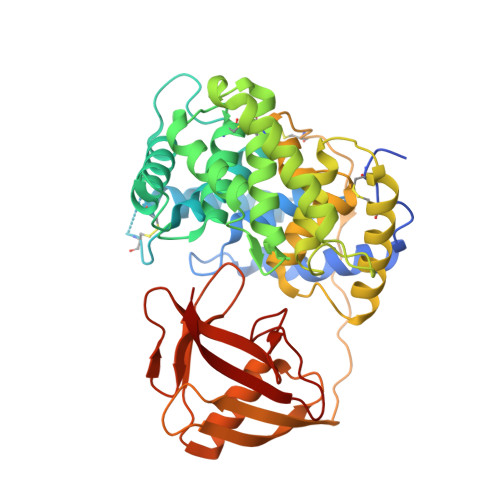The structure of the rat vitamin B 12 transporter TC and its complex with glutathionylcobalamin.
Bokhove, M., Kawamura, T., Okumura, H., Goto, S., Kawano, Y., Werner, S., Jarczowski, F., Klimyuk, V., Saito, A., Kumasaka, T.(2024) J Biol Chem 300: 107289-107289
- PubMed: 38636663
- DOI: https://doi.org/10.1016/j.jbc.2024.107289
- Primary Citation of Related Structures:
8IXT, 8IXU - PubMed Abstract:
Vitamin B 12 (cobalamin or Cbl) functions as a cofactor in two important enzymatic processes in human cells, and life is not sustainable without it. B 12 is obtained from food and travels from the stomach, through the intestine, and into the bloodstream by three B 12 -transporting proteins: salivary haptocorrin (HC), gastric intrinsic factor, and transcobalamin (TC), which all bind B 12 with high affinity and require proteolytic degradation to liberate Cbl. After intracellular delivery of dietary B 12 , Cbl in the aquo/hydroxocobalamin form can coordinate various nucleophiles, for example, GSH, giving rise to glutathionylcobalamin (GSCbl), a naturally occurring form of vitamin B 12 . Currently, there is no data showing whether GSCbl is recognized and transported in the human body. Our crystallographic data shows for the first time the complex between a vitamin B 12 transporter and GSCbl, which compared to aquo/hydroxocobalamin, binds TC equally well. Furthermore, sequence analysis and structural comparisons show that TC recognizes and transports GSCbl and that the residues involved are conserved among TCs from different organisms. Interestingly, haptocorrin and intrinsic factor are not structurally tailored to bind GSCbl. This study provides new insights into the interactions between TC and Cbl.
Organizational Affiliation:
Structural Biology Division, Japan Synchrotron Radiation Research Institute (JASRI), Sayo, Hyogo, Japan. Electronic address: [email protected].


















